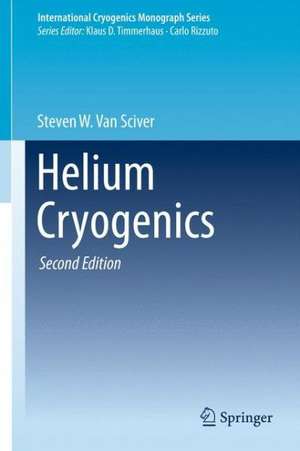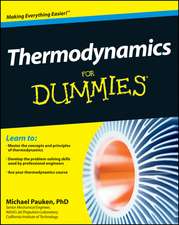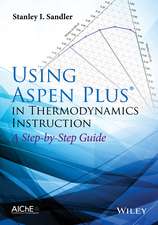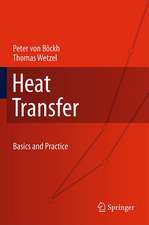Helium Cryogenics: International Cryogenics Monograph Series
Autor Steven W. Van Sciveren Limba Engleză Hardback – 10 feb 2012
Helium Cryogenics, 2nd edition brings these advances in helium cryogenics together in an updated form. As in the original edition, the author's approach is to survey the field of cryogenics with emphasis on helium fluids. This approach is more specialized and fundamental than that contained in other cryogenics books, which treat the associated range of cryogenic fluids. As a result, the level of treatment is more advanced and assumes a certain knowledge of fundamental engineering and physics principles, including some quantum mechanics.
The goal throughout the work is to bridge the gap between the physics and engineering aspects of helium fluids to provide a source for engineers and scientists to enhance their usefulness in low-temperature systems.
Dr. Van Sciver is a Distinguished Research Professor and John H. Gorrie Professor of Mechanical Engineering at Florida State University. He is also a Program Director at the National High Magnetic Field Laboratory (NHMFL). Dr. Van Sciver joined the FAMU-FSU College of Engineering and the NHMFL in 1991, initiating and teaching a graduate program in magnet and materials engineering and in cryogenic thermal sciences and heat transfer. He also led the NHMFL development efforts of the cryogenic systems for the NHMFL Hybrid and 900 MHz NMR superconducting magnets. Between 1997 and 2003, he served as Director of Magnet Science and Technology at the NHMFL. Dr. Van Sciver is a Fellow of the ASME and the Cryogenic Society of America and American Editor for the journal Cryogenics. He is the 2010 recipient of the Kurt Mendelssohn Award.
Prior to joining Florida State University, Dr. Van Sciver was Research Scientist and then Professor of Nuclear Engineering, Engineering Physics and Mechanical Engineering at the University of Wisconsin-Madison from 1976 to 1991. During that time he also served as the Associate Director of the Applied Superconductivity Center. Dr. Van Sciver received his PhD in Low Temperature Physics from the University of Washington-Seattle in 1976. He received his BS degree in Engineering Physics from Lehigh University in 1970.
Dr. Van Sciver is author of over 200 publications and patents in low temperature physics, liquid helium technology, cryogenic engineering and magnet technology. The first edition of Helium Cryogenics was published by Plenum Press (1986). The present work is an update and expansion of that original project.
| Toate formatele și edițiile | Preț | Express |
|---|---|---|
| Paperback (1) | 1389.62 lei 6-8 săpt. | |
| Springer – iul 2015 | 1389.62 lei 6-8 săpt. | |
| Hardback (1) | 1160.84 lei 38-44 zile | |
| Springer – 10 feb 2012 | 1160.84 lei 38-44 zile |
Din seria International Cryogenics Monograph Series
- 18%
 Preț: 948.29 lei
Preț: 948.29 lei - 18%
 Preț: 952.57 lei
Preț: 952.57 lei - 18%
 Preț: 1662.85 lei
Preț: 1662.85 lei - 18%
 Preț: 1225.94 lei
Preț: 1225.94 lei - 18%
 Preț: 948.61 lei
Preț: 948.61 lei - 18%
 Preț: 1842.79 lei
Preț: 1842.79 lei - 18%
 Preț: 948.16 lei
Preț: 948.16 lei - 24%
 Preț: 1081.72 lei
Preț: 1081.72 lei - 18%
 Preț: 962.49 lei
Preț: 962.49 lei - 18%
 Preț: 1070.60 lei
Preț: 1070.60 lei -
 Preț: 394.87 lei
Preț: 394.87 lei - 18%
 Preț: 1218.21 lei
Preț: 1218.21 lei - 15%
 Preț: 643.34 lei
Preț: 643.34 lei - 24%
 Preț: 952.89 lei
Preț: 952.89 lei - 24%
 Preț: 727.78 lei
Preț: 727.78 lei - 18%
 Preț: 945.79 lei
Preț: 945.79 lei - 18%
 Preț: 1111.67 lei
Preț: 1111.67 lei - 23%
 Preț: 832.28 lei
Preț: 832.28 lei - 18%
 Preț: 747.38 lei
Preț: 747.38 lei
Preț: 1160.84 lei
Preț vechi: 1527.42 lei
-24% Nou
Puncte Express: 1741
Preț estimativ în valută:
222.13€ • 232.51$ • 184.88£
222.13€ • 232.51$ • 184.88£
Carte tipărită la comandă
Livrare economică 27 martie-02 aprilie
Preluare comenzi: 021 569.72.76
Specificații
ISBN-13: 9781441999788
ISBN-10: 1441999787
Pagini: 496
Ilustrații: XXIV, 470 p. 220 illus., 9 illus. in color.
Dimensiuni: 155 x 235 x 31 mm
Greutate: 0.82 kg
Ediția:2nd ed. 2012
Editura: Springer
Colecția Springer
Seria International Cryogenics Monograph Series
Locul publicării:New York, NY, United States
ISBN-10: 1441999787
Pagini: 496
Ilustrații: XXIV, 470 p. 220 illus., 9 illus. in color.
Dimensiuni: 155 x 235 x 31 mm
Greutate: 0.82 kg
Ediția:2nd ed. 2012
Editura: Springer
Colecția Springer
Seria International Cryogenics Monograph Series
Locul publicării:New York, NY, United States
Public țintă
ResearchCuprins
Cryogenic Principles and Applications.- Low-Temperature Materials Properties.- Helium as a Classical Fluid.- Classical Helium Fluid Mechanics.- Classical Helium Heat Transfer.- Helium as a Quantum Fluid.- He II Heat and Mass Transfer.- Liquefaction and Refrigeration Systems.- 3He and Refrigeration Below 1K.- Special Topics in Helium Cryogenics.
Recenzii
“Steven W Van Sciver’s ‘Helium Cryogenics’ is used as a textbook in a graduate level mechanical engineering course. … It goes into fine details of some of the complexities of heat transfer and flow of various states and mixtures of states of He. … For those interested in the cryogenic properties of 3He and 4He this book is an invaluable reference, as it has an account of all the current knowledge on the subject.” (Blair Jamieson, Physics in Canada, La Physique au Canada, Vol. 69 (3), 2013)
Textul de pe ultima copertă
Twenty five years have elapsed since the original publication of Helium Cryogenics. During this time, a considerable amount of research and development involving helium fluids has been carried out culminating in several large-scale projects. Furthermore, the field has matured through these efforts so that there is now a broad engineering base to assist the development of future projects.
Helium Cryogenics, 2nd edition brings these advances in helium cryogenics together in an updated form. As in the original edition, the author's approach is to survey the field of cryogenics with emphasis on helium fluids. This approach is more specialized and fundamental than that contained in other cryogenics books, which treat the associated range of cryogenic fluids. As a result, the level of treatment is more advanced and assumes a certain knowledge of fundamental engineering and physics principles, including some quantum mechanics.
The goal throughout the work is to bridge the gap between the physics and engineering aspects of helium fluids to provide a source for engineers and scientists to enhance their usefulness in low-temperature systems.
Dr. Van Sciver is a Distinguished Research Professor and John H. Gorrie Professor of Mechanical Engineering at Florida State University. He is also a Program Director at the National High Magnetic Field Laboratory (NHMFL). Dr. Van Sciver joined the FAMU-FSU College of Engineering and the NHMFL in 1991, initiating and teaching a graduate program in magnet and materials engineering and in cryogenic thermal sciences and heat transfer. He also led the NHMFL development efforts of the cryogenic systems for the NHMFL Hybrid and 900 MHz NMR superconducting magnets. Between 1997 and 2003, he served as Director of Magnet Science and Technology at the NHMFL. Dr. Van Sciver is a Fellow of the ASME and the Cryogenic Society of America and American Editor for the journal Cryogenics. He is the 2010 recipient of the Kurt Mendelssohn Award.
Prior to joining Florida State University, Dr. Van Sciver was Research Scientist and then Professor of Nuclear Engineering, Engineering Physics and Mechanical Engineering at the University of Wisconsin-Madison from 1976 to 1991. During that time he also served as the Associate Director of the Applied Superconductivity Center. Dr. Van Sciver received his PhD in Low Temperature Physics from the University of Washington-Seattle in 1976. He received his BS degree in Engineering Physics from Lehigh University in 1970.
Dr. Van Sciver is author of over 200 publications and patents in low temperature physics, liquid helium technology, cryogenic engineering and magnet technology. The first edition of Helium Cryogenics was published by Plenum Press (1986). The present work is an update and expansion of that original project.
Helium Cryogenics, 2nd edition brings these advances in helium cryogenics together in an updated form. As in the original edition, the author's approach is to survey the field of cryogenics with emphasis on helium fluids. This approach is more specialized and fundamental than that contained in other cryogenics books, which treat the associated range of cryogenic fluids. As a result, the level of treatment is more advanced and assumes a certain knowledge of fundamental engineering and physics principles, including some quantum mechanics.
The goal throughout the work is to bridge the gap between the physics and engineering aspects of helium fluids to provide a source for engineers and scientists to enhance their usefulness in low-temperature systems.
Dr. Van Sciver is a Distinguished Research Professor and John H. Gorrie Professor of Mechanical Engineering at Florida State University. He is also a Program Director at the National High Magnetic Field Laboratory (NHMFL). Dr. Van Sciver joined the FAMU-FSU College of Engineering and the NHMFL in 1991, initiating and teaching a graduate program in magnet and materials engineering and in cryogenic thermal sciences and heat transfer. He also led the NHMFL development efforts of the cryogenic systems for the NHMFL Hybrid and 900 MHz NMR superconducting magnets. Between 1997 and 2003, he served as Director of Magnet Science and Technology at the NHMFL. Dr. Van Sciver is a Fellow of the ASME and the Cryogenic Society of America and American Editor for the journal Cryogenics. He is the 2010 recipient of the Kurt Mendelssohn Award.
Prior to joining Florida State University, Dr. Van Sciver was Research Scientist and then Professor of Nuclear Engineering, Engineering Physics and Mechanical Engineering at the University of Wisconsin-Madison from 1976 to 1991. During that time he also served as the Associate Director of the Applied Superconductivity Center. Dr. Van Sciver received his PhD in Low Temperature Physics from the University of Washington-Seattle in 1976. He received his BS degree in Engineering Physics from Lehigh University in 1970.
Dr. Van Sciver is author of over 200 publications and patents in low temperature physics, liquid helium technology, cryogenic engineering and magnet technology. The first edition of Helium Cryogenics was published by Plenum Press (1986). The present work is an update and expansion of that original project.
Caracteristici
Provides readers with an excellent introduction to the field while providing extensive references for those who want to explore the topic further Brings the topic up-to-date, covering fundamentals as well as modern research results obtained over the past 25 years Serves as an important teaching tool as well as a reference for very low temperature engineering practice Includes supplementary material: sn.pub/extras











